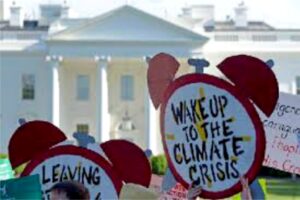
[Reprinted: The Lancet Infectious Diseases, 11-12-2020]
The result of the eagerly awaited US presidential elections held on Nov 3, 2020, is finally known: the Democratic candidate Joe Biden defeated incumbent President Donald Trump. Biden will be inaugurated as the 46th US president on Jan 20, 2021. The months leading to Biden’s final election were riddled with tension within the USA, and President Trump—never known to take hard evidence too seriously—is questioning the number of votes cast for Biden and threatening to make a legal challenge to the election results. In this volatile climate, what might a Biden administration do to bolster the role of science in US policy?
After 4 years under Trump’s abrasive presidency, the USA is politically and culturally divided and the ongoing COVID-19 pandemic, which in the USA has caused the highest number of deaths in a single country in the world, has further highlighted ongoing issues of inequality, racism, and mistrust in science. Moreover, the image and the role of the USA in global health have been damaged by Trump’s questionable positions, such as the interruption of funding for WHO and withdrawal from the Paris Agreement to combat the climate crisis. Although Biden has pledged to reinstate financial support to WHO as soon as he assumes office, it will take time and effort to restore the USA to a leadership position in global health. Moreover, relationships between the USA and WHO have turned sour in the past year, and the rift has shown that the USA might be an unreliable partner in global health, although thanks to its financial power, the country could soon regain its previous key position.
Regarding the COVID-19 pandemic, in his electoral programme Biden stated that the focus will be on a “decisive public health response that ensures the wide availability of free testing; the elimination of all cost barriers to preventive care and treatment for COVID-19; the development of a vaccine; and the full deployment and operation of necessary supplies, personnel, and facilities”, as well as economic support for all those affected by the measures required to curb the pandemic. Because of the variability of control measures among states, there is hope that under Biden the federal government will take a stronger role in implementing uniform policies and rules to control COVID-19.
However, the main challenges that Biden will face are restoring the credibility of the US Centers for Disease Control and Prevention (CDC) as the lead scientific adviser on the management of the pandemic and more broadly putting scientific evidence back at the centre of any decision made about COVID-19. Trump’s administration has often conflicted with CDC experts who openly expressed concerns about the management and the epidemiological path of COVID-19 in the USA. Instead, the government’s line was often that the situation was under control despite the skyrocketing number of infections and deaths across the country. This conflict led to the unprecedented appointment of two government officials within the CDC headquarters in Atlanta, GA, to allow control of the information coming out from the agency. Similarly, the position of the head of the National Institutes of Health, Anthony Fauci, came under threat for his evidence-based comments on the pandemic that irked Trump to the point that the president stated he was considering firing Fauci. Although Fauci’s dismissal is improbable, Trump’s statement was particularly worrying because it came just after an executive order issued on Oct 21 that would allow civil servants to be fired for political reasons. Biden will have the chance to rectify the situation but time is against him: before the order takes effect, federal agencies have 90 days to review which types of positions would be impacted, for a deadline falling the day before the presidential inauguration.
There is hope that under Biden’s presidency, recommendations for COVID-19 control will be based on scientific evidence to avoid questionable decisions made by Trump’s administration, such as the endorsement of hydroxychloroquine as a prophylactic and therapeutic option and the licensing of remdesivir for treatment of COVID-19 patients by the Food and Drug Administration, despite lack of efficacy in the Solidarity trial. The appointment of infectious disease experts in Biden’s COVID-19 task force on Nov 9 is a step in the right direction. Overall, there is hope that the interference of politics in health decisions will be less evident under Biden.
The election of Joe Biden opens a new chapter in US politics with the prospect of international collaboration and trust in science. Its impact on global health is yet unknown but the return of the USA to the table is most welcome.